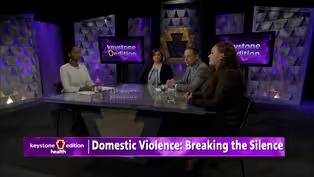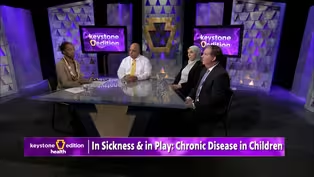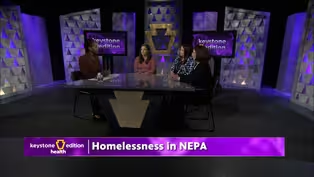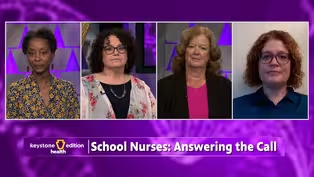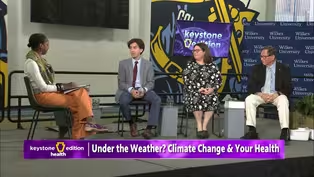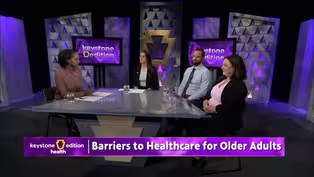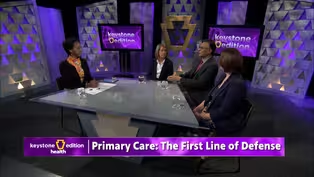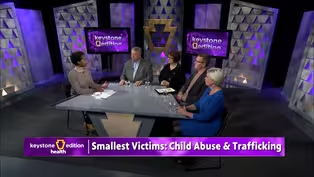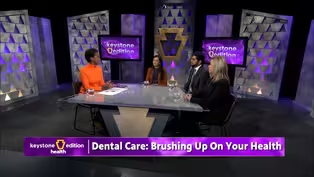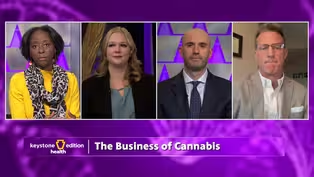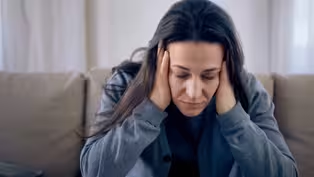Keystone Edition
Mental Health Matters
5/27/2021 | 27m 9sVideo has Closed Captions
Mental health has started to grow from a secret struggle to a more open conversation.
As people work to reduce the stigma around mental illness, mental health has started to grow from a secret struggle tackled by individuals, to a more open conversation. Adequate treatment, however, can still be difficult to come by. While 17.52 percent of adults in Pennsylvania have a form of mental illness, 20.9 percent of Pennsylvanians seeking mental health treatment report finding it either
Problems playing video? | Closed Captioning Feedback
Problems playing video? | Closed Captioning Feedback
Keystone Edition is a local public television program presented by WVIA
Keystone Edition
Mental Health Matters
5/27/2021 | 27m 9sVideo has Closed Captions
As people work to reduce the stigma around mental illness, mental health has started to grow from a secret struggle tackled by individuals, to a more open conversation. Adequate treatment, however, can still be difficult to come by. While 17.52 percent of adults in Pennsylvania have a form of mental illness, 20.9 percent of Pennsylvanians seeking mental health treatment report finding it either
Problems playing video? | Closed Captioning Feedback
How to Watch Keystone Edition
Keystone Edition is available to stream on pbs.org and the free PBS App, available on iPhone, Apple TV, Android TV, Android smartphones, Amazon Fire TV, Amazon Fire Tablet, Roku, Samsung Smart TV, and Vizio.
Providing Support for PBS.org
Learn Moreabout PBS online sponsorshipMore from This Collection
Healthcare is constantly changing as technology finds new and better ways to help people live longer, healthier lives. Host Tonyehn Verkitus will address the issues that are important to the people in our community, including the ongoing pandemic, concerns about vaccines, food deserts, childhood trauma and child abuse, mental health, environmental issues, and the rising cost of staying healthy wit
Domestic Violence: Breaking the Silence
Video has Closed Captions
Access to the right resources can make facing this challenge a little easier for families (26m 59s)
In Sickness and in Play: Chronic Disease in Children
Video has Closed Captions
About 25% of children in the US aged 2 to 8 years have a chronic health condition (27m)
Video has Closed Captions
Homelessness can happen to anyone at any age or socio-economic status. (26m 59s)
Video has Closed Captions
As we raise the visibility on Transgender young adults and embrace them within our culture (26m 59s)
Video has Closed Captions
Obesity is a serious risk factor many try to avoid when developing healthy eating habits. (27m)
School Nurses: Answering the Call
Video has Closed Captions
What can our school districts do to help retain and recruit nurses for future generations? (27m)
Under the Weather? Climate Change & Your Health
Video has Closed Captions
How does climate change impact individual and public health? (54m 59s)
Barriers to Healthcare of Older Adults
Video has Closed Captions
What progress have local organizations made in addressing these challenges? (27m)
Primary Care: The First Line of Defense
Video has Closed Captions
When was the last time you saw your primary care doctor? (27m)
The Smallest Victims: Child Abuse & Trafficking
Video has Closed Captions
What are the signs to know to spot child abuse and even possible trafficking? (27m)
Dental Care: Brushing Up on Your Health
Video has Closed Captions
How can providers make dental care more affordable and accessible? (26m 59s)
Video has Closed Captions
What does the cannabis industry mean for Northeastern and Central Pennsylvania? (26m 59s)
Providing Support for PBS.org
Learn Moreabout PBS online sponsorship- [Narrator] Live from your Public Media Studios, WVIA presents "Keystone Edition Health" a public affairs program that goes beyond the headlines to address issues in Northeastern and Central Pennsylvania.
This is "Keystone Edition Health."
And now, moderator Tonyehn Verkitus.
- Good evening and welcome to "Keystone Edition Health."
I'm Tonyehn Verkitus and thank you for joining us.
It's Mental Health Awareness Month and tonight we'll discuss how to stay aware and take care of our mental health even through difficulties such as finding mental health providers or facing the stigma that still accompanies mental illness.
Have questions?
Call +1 800-326-9842, email keystone@wvia.org or use #keystonehealth on social media.
First let's hear from WVIA's Paul Lazar.
(air whooshing) - [Paul] Much of healthcare focuses on physical health but to live our healthiest lives, we cannot forget to care for our mental health.
One in five U.S. adults experienced mental illness each year according to the national Alliance on mental illness.
But can everyone experiencing mental illness, get adequate care?
Some may not seek care due to stigmas or have difficulty locating care when 55% of counties in the U.S do not have a practicing psychiatrist.
In 2019, NAMI reported 20.6% of U.S. adults experienced mental illness.
However, more than half of them did not receive treatment.
Providers in Northeastern, Pennsylvania including Geisinger and Scranton's own branch of NAMI, seek to make mental health care accessible for area residents and reduce the stigmas that might discourage people from caring for their mental wellbeing.
For "Keystone Edition Health," I'm Paul Lazar.
(upbeat music) - Joining us tonight, is Bill Poray, clinical manager at Community Care Behavioral Health.
Also in the WVIA studio, we have Marie Onukiavage, Executive Director of NAMI Northeast region, Pennsylvania and joining us via Zoom is Jordan Barbour, Director of Operations at Geisinger.
Thank you all for joining us.
If you have questions for one of our guests, call +1 800-326-9842, email@keystoneatwvu.org or on social media, #keystonehealth.
Welcome everyone.
- Thank you.
- Thank you.
- Marie, I would love if you could tell us a little bit about NAMI, how long it's been around and how long it's been serving this region?
- Sure, NAMI has been around for over 40 years.
About 1979, a few parents sitting around a kitchen table in Minnesota, and they had adult children with serious mental illness and after getting them connected to services, they said, "what about us?
We need help.
We need support.
We need education.
We need to know how to support our children with mental illness."
And NAMI was formed.
And since then, it has grown to an affiliate organization where we have affiliates across the country over, I'm not sure how many affiliates in every state and we've been in the Scranton Area where we grew from the Scranton Area affiliate to the Northeast Region affiliate.
We've been here for informally almost 40 years.
We've had a formal office for about 25 years.
- Bill, Community Care is a little different because you're actually providing clinical services, but you're dealing with substance use and mental health.
Can you tell us a little bit about the work that you're doing there?
- Sure, Community Care Behavioral Health Organization, we're a subsidiary of UPMC.
We're a behavioral health managed care organization.
And when people think of a managed care organization, they think of insurances containing costs.
But CCBH does so much more.
We provide behavioral health services which are mental health and substance use treatment for those individuals that are the most vulnerable in society.
Those with medical assistance because there's a lot of psychosocial issues, stressors that go along with the most vulnerable individuals, not only do we manage their insurance benefits, attempt to get them into the right possible treatment in the in the quickest time, but we also reach out to them to make sure that they're following up with their appointments try to get them connected to medical care, try to get them connected to unemployment services, or homeless whatnot.
So we do more than just provide for the benefit insurance benefits for those individuals.
- Jordan, now where you are at Geisinger, you're looking at things from more of a systems level perspective.
Before we get into the details of that, can you share the locations that you oversee?
- Absolutely.
So, first and foremost we have our inpatient drug and alcohol rehab facility Geisinger Marwoth which is located just north of Scranton in the town of Waverly.
There we provide inpatient detox and rehab.
We also have a suite of outpatient services both addiction medicine delivered through our specialty physicians as well as a counseling service, we've got four in-person clinics in Williamsport, Bloomsburg, Wilkes-Barre and Scranton as well we're providing a healthy amount of telemedicine.
We do a lot of work in partnership with our various hospitals, emergency departments, Geisinger health plan as well as other specialties as we know substance use disorder addiction and mental health in general is not confined to a particular area on the healthcare continuum.
We see these issues manifest everywhere and so we're doing our best to integrate with our partners as well as provide access to the specialty services in the community.
- Now Bill, just to help our viewers understand, can you tell us the difference between mental health and behavioral health care?
- Well, when I look at mental health, I look at mental health as being a part of behavioral health and vice versa that certainly mental health is related to someone's emotional symptoms, their thinking and then behavioral health or the behaviors that go along with those symptoms.
So I don't really see too much of a separation, I see them as being one in the same.
- Jordan, how is behavioral health care treated differently within the system than other health care activities that are happening?
- That's a terrific question.
There's a number of differences.
First and foremost, there's regulatory differences, both at the federal and state level, and there's payment differences.
We pay for physical health differently than we pay for behavioral health.
And because of those two structural components the way that behavioral health is delivered by healthcare providers in some ways, and historically certainly has been separate from the way that we take care of cardiology, OB-GYN, other traditional physical health specialties.
So, I think that the evidence is showing us these days, there's opportunity to integrate and some of the structure regulatory and payment structure is our opportunity to facilitate that integration.
- Finding mental health care can be difficult but we met a local resident who knows just how beneficial regular care can be.
Take a look.
(air whooshing) - Well, my mental health journey has been somewhat of a roller coaster at times.
I have lived for 38 years with a bipolar illness and I've had manic episodes and I've had depressive episodes.
Each one is different and unique.
I've been hospitalized about seven times since I was diagnosed back in '84, when I'm in a manic episode, I at times I don't believe that I have the illness where that I've been cured of the illness.
So in that sense I've delayed treatment.
But with my family support, I've always been able to get treatment.
And I've been fortunate that I've had insurance that would help me get treatment for my mental illness.
Accessibility with healthcare in Northeastern, Pennsylvania is a little tricky and challenging because there's a short supply of psychiatrists and therapists.
So, it makes it a difficult to get a treatment but that doesn't mean that you shouldn't seek treatment and try within the parameters of the mental health community here in Northeastern PA.
So having a hobby and a structure in my life, really helps me in treating my illness.
I enjoy cooking, I enjoy exercise, you know, keeping a healthy diet and a healthy activity schedule is really a beneficial to me.
I am treating my mental illness.
My advice to anyone who has a mental illness is to seek treatment.
Through treatment you can live a very successful life and there are struggles associated with it in stigma but I think that if you seek the treatment and avail yourself to the medical advances that have been made over the years, you can really live a successful life.
(upbeat music) - Marie, at NAMI, you're not providing clinical services but you are providing other sorts of support and resources for your clients.
Can you tell us a little bit about these resources?
- Sure, sure we have support groups that meet in the community for individuals living with mental illness, for family members, for friends, we have three different groups that meet throughout the community, Wayne County, Pike County, Lackawanna County, we have a group that's about to start up only for individuals living with mental illness.
We have education programs.
We have a family to family which is an eight session.
One night a week for eight weeks.
Session program for family members to understand mental illness, to understand how to communicate with their loved one, how to recognize and respond to a crisis, how to take care of themselves.
We have a peer-to-peer program which is the flip side of the family.
It's for the individual.
Basic same things, basically you know, understanding the illness, how to take care of themselves, how to find their own journey of recovery.
All of those programs are free.
We have something called family and friends which is just a 90 minute seminar, kind of a very, very super condensed family to family, just some basic information about mental illness, about how to navigate a crisis, how to take care of yourself, how to take care of your loved one.
- Now you also at Community Care are providing resources outside of just clinical service and I believe you're also providing resources for the family as well.
What are some of those?
- Sure, so we have employed by Community Care, we have community health workers.
So they're actually the boots on the ground.
They're going to the EDS and meeting with members as they're going into the hospital.
They're making that the members are getting to their appointments and follow-up getting there the appropriate follow-up.
There's also a family advisory board that we help to encourage and grow.
There's also opportunities for those with both mental illness and substance use disorders that are in recovery to be able to give back in a sense, in a professional or pseudo professional manner.
There's certified recovery specialists that focus on the DNA side, there's certified peer specialists that are able to help those with mental illness and there's always a crossover.
There's always a crossover between the substance use individuals and those with mental health issues.
- Jordan, at Geisinger I know you're tryna change the way you do things, not doing things the way you've done them in the past, but trying to break down the silos between psychiatric and addiction care, can you tell us a little bit about that?
- Absolutely.
I think there's multiple perspectives to this.
I'll give you one example is working to integrate behavioral and psychiatric services and our addiction specialty programs.
So for example, having the psychologist and psychiatrist services available at Geisinger Marworth, that's one thing that we're doing.
The flip side is having addiction services available and traditional behavioral health services.
So on our inpatient psychiatric units and elsewhere, so Bill brought up the CRS Certified Recovery Specialist profession.
In some of our hospitals, we have CRSs that go in meet with patients on the inpatient psychiatric units, and speak with them about their recovery options.
So, those are just two examples Tonyehn and about how we're trying to bridge the gap, I'll bring up a third gap which is taking behavioral health services and integrating them into physical health environments and treatment programs, example being how we've taken our psychologist and integrated them into our primary care clinics.
So, in many Geisinger primary care clinics, you can go in, you can see your primary care physician, and in the same visit, you can see your psychologist in the same facility.
So those are a couple of examples how we've integrated both philosophically and by way of putting the same service in the same facility.
- Marie, I understand that even above and beyond the work that you're doing for your clients and their families, there's other services that you're bringing into the community with the crisis intervention team, can you tell us about that?
- Sure, NAMI has been involved with crisis intervention team since its inception here in Northeastern, Pennsylvania.
We've worked closely with the Advocacy Alliance to facilitate that program.
CIT is training for law enforcement and other first responders on how to recognize and respond to someone in a mental health crisis in a way that deescalates a situation and hopefully guides them to a more appropriate response then getting involved with criminal justice system.
- And are you finding Bill that besides your patients right now during COVID, have your providers dealt with any mental health issues or burnout?
- Most definitely yeah and I think what's important, what differentiates community care is the importance that we emphasize on the collaboration of our providers throughout the whole pandemic.
We've had continued to have a virtual webinars and trainings that are focused on a multitude of topics including how to take care of the caretaker and I think that's really important because we tend to be the worst at taking care of ourselves.
And particularly in this time, this pandemic time, it's become even more essential to be able to do that.
- Jordan, while we're talking about the pandemic, how has it changed the way that you're providing service?
And would you say that services have increased during this period?
- Well, I would say that services have changed.
Telemedicine is much more accessible now than it's ever been, which allows folks the opportunity to seek and access care from the comfort of their home, or by way of accessing a clinic that's closer to their home.
So in that respect, I think it's been easier to access care.
The flip side of the coin is there's been very real challenges, right?
COVID has shut down and some of our facilities or severely limited our ability to provide in-person services.
I can speak specifically for Marwoth, we've had challenges.
We've had to limit capacity, the number of admissions we've been able to take throughout the COVID pandemic by and large we've resolved those and we're back to full capacity, but there's been challenges across the board.
So I think it's changed and I think depending on the service you've been seeking it has become more difficult.
- Marie, could you speak to this a little bit as well?
I would imagine that your clients are probably experiencing different types of treatment plans.
How does that affect the way that they may be utilizing the support groups that you provide?
- Very early on, we went to a virtual format offering our support groups via Zoom, some folks took advantage of that, some folks didn't embrace it for a lot of different reasons.
Not everybody has access to the internet.
Not everybody has access to a device that allows them to access Zoom.
So that was a barrier and some folks just weren't comfortable.
On the other hand we've been able to reach people who we might not have for those geographical transportation barriers that would have prevented them from coming to a group before folks not liking to drive at night.
Now it's no longer an issue.
So it's been a mixed kind of like Jordan said, it's been a mixed response.
We have groups meeting again, in-person now and some people are very happy about that.
Of course as we discuss mental health, I think it's important that we bring up the issue of stigma.
I believe there's still plenty of stigma out there around mental health.
What do you tell people, that you think can help them better understand mental illness and maybe be more accepting of it?
- I think the fact that we have a whole month devoted to mental health, that more and more people stars are coming out of the closet so to speak and identifying proclaiming that they are in either recovery from a substance use issue, or mental health issue, whether, excuse me whether be a mood disorder, an eating disorder, what have you, more and more people are being able to come out and I think that really is making it okay to be able to say like the gentleman Owen can be able to come out and have that little snippet showing that someone like him is able to function, not only function but thrive.
I think it's important to be able for individuals to see that and again, mental health disorders are a...
There's a medical, there's a biological component associated with that.
- Jordan, I was just thinking back to what you said about Marworth and the fact that you had less capacity than normal because of COVID.
Did you ever find yourself in a position where maybe you couldn't take someone in and if you can't, how do you deal with something like that?
- Absolutely.
I think in the earliest stages of the pandemic, our objective was to provide saving addiction treatment.
And I would highlight that, right?
The treatment we provide could save someone's life today, tomorrow, and next month and into the future.
But it was a priority to stop the spread of the COVID virus.
And it's easy to forget what we didn't know.
March, April, May, June of last year.
And so there was challenges and we had to make tough decisions.
I'll say that's where being a part of a network and having strong colleagues like CCBH and like our community partners allowed us to make sure that we could refer someone to a another appropriate service.
We sometimes will refer them to our outpatient services and do our best to manage them in that capacity.
So there's options.
It's never a warm and fuzzy feeling, balancing really competing priorities, it's something that all programs, whether it's an inpatient behavioral health or an inpatient addiction treatment facility struggled with over the past year.
- I believe we have a question from Kathleen in Wilkes-Barre.
(Kathleen speaking faintly) - I don't believe it's coming out.
Maybe we lost her, sorry.
Oh, hi.
- [Kathleen] Hi, I was wondering about the Mental Health Parity Act.
I know that was a promising initiative on the federal level that would help with the funding, also state funding.
Has the funding increased and how has it affected the volume and the delivery of services?
- Jordan, would you like to answer that question?
- Absolutely, so mental health parity (indistinct), was and I'll just summarize for our viewers, an attempt by legislation to force insurance companies to pay the same amount for mental health services that they would for physical health services.
You know, I think the challenge with that has been enforcement.
It's great to have a law.
It's great to have regulations but enforcement has been challenging and there's been many documented national examples of that.
You can do a quick Google search, I know in the state of Pennsylvania, they're making a concerted effort to crack down but nonetheless, I think there's some untoward behavior that that continues.
In terms of funding I think absolutely there has been increase in funding largely by way of grants both at the federal and state level which is tremendously helpful for starting new programs.
I think the next step and the next opportunity is to look at sustainable funding streams to sustain those programs.
Grants expire, and then what you do.
And so I think there is opportunity for thinking big picture about how we pay for mental health both in terms of the amount of money we put towards mental health and how we allocate it.
- Marie, to piggyback on this, are you aware of any current legislation that affects mental health issues or people affected by mental health?
- I'm not aware of any current legislation right now.
I do know that this week, members of the House and the Senate are both in hearings, hearing about funding for the National Institute of Health which includes the National Institute of Mental Health.
I do hope that they choose to increase that funding.
We've come far with our mental health treatment but we certainly see that there there's a lot of gaps.
- Bill, did you wanna add to that?
- During the... And this is the part of the Governor Wolf's emergency declaration due to the COVID pandemic, there was the 1135 waiver which allowed providers to not have to go through the administrative policies, procedures, the roadblocks if you will of getting members, clients, individuals in for the treatment, of being able to go through and because again as you mentioned earlier, COVID pandemic really heightened the anxiety and depressive issues by our population.
- So would you say that mental health is a public health issue or crisis?
And how can the community rise to the challenge of helping?
- Without a doubt as an organization, CCBH sees this all the time, there's the issues of poverty, homelessness, unemployment, criminal justice issues and so what CCBH has really done is to take a look at the holistic perspective and be able to wherever possible, to be able to address each one of those tiles of the mosaic, if you will.
- And Marie quickly before we end, I just wanted you to let people know how they can learn about services at NAMI or where they go online.
- Alright, they can visit us at our website www.naminpa.org, they can call us 570-342-1047, they can email us info@naminpa.org or they can follow us on social media.
We're on Facebook and we're on Instagram NAMInpa - [Tonyehn] And just out of curiosity, are you doing your events this year?
- We have...
This is the second year in a row, we've had to cancel our walk and it's so hard we're looking at other options maybe fall, but so far, no walks.
- Thank you.
Well, I'd like to thank our panelists.
I appreciate your all being here.
Thank you for participating and thank you for all the information you've given us on this topic.
For more information on this topic, please visit wvia.org and remember you can rewatch this episode or any previous episode on demand anytime online or on the WVIA app.
For "Keystone Edition," I'm Tonyehn Verkitus and thank you for watching (bright upbeat music)
Mental Health Matters - Preview
Preview: 5/27/2021 | 30s | Watch Thursday, May 27th at 8pm on WVIA TV (30s)
Providing Support for PBS.org
Learn Moreabout PBS online sponsorship
- News and Public Affairs

Top journalists deliver compelling original analysis of the hour's headlines.

- News and Public Affairs

FRONTLINE is investigative journalism that questions, explains and changes our world.












Support for PBS provided by:
Keystone Edition is a local public television program presented by WVIA
